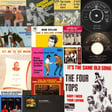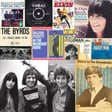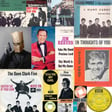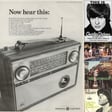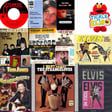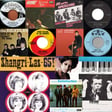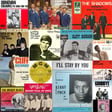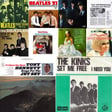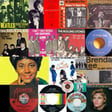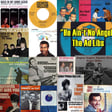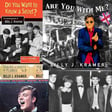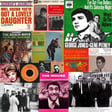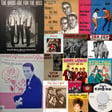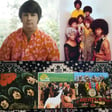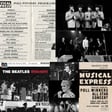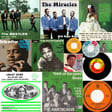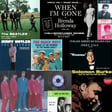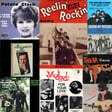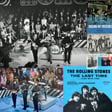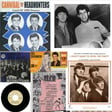Become a Creator today!Start creating today - Share your story with the world!
Start for free
00:00:00
00:00:01

September 1964 (side C)
More of the American charts! Hawaiian music comes to the US, Barbra Streisand (or the people around her) cash in on Funny Girl, The Hondells, the Blendells, but no Michael Dells. Meanwhile, Jay and the Americans continue rolling while Capitol and the Beatles also do their thing! Create your podcast today! #madeonzencastr
Recommended
Transcript
Beatles' Motivational Chant
00:00:00
Speaker
the Beatles had this chant John Paul and George and probably then Stuart and Pete had this chant when things weren't going well which in their world wasn't very often because mostly it was an upward trajectory but nonetheless sometimes you know a bad night or the gig we you know didn't work properly or the amps broke or whatever I say where are we going fellas and they'd go to the top Johnny and I say where's that fellas and they say to the top of most of the papamos I say right and we'd also cheer up. hey hey Where are we going fellas? To the top! What top? To the very top! Now this Tron and John would say where are we going fellas and the others in an American accent and the others would say to the top Johnny get the exact wording right um where's that fellas to the topper most of the popper most Johnny?
00:00:53
Speaker
And that was their rallying call in when times were bad to kind of, yes, you know we're still here, we're still together. A lot of irony in it as well. It was kind of done in a heavy American accent as a sender.
Patreon Launch for Extended Content
00:01:11
Speaker
A quick message to let you know that we have opened a Patreon to support this podcast. We are planning to do extended interviews with many of the figures you hear in our regular episodes.
00:01:23
Speaker
We already have hour-long versions of our chat with Jim Birkenstadt and producer Shell Tellme. Join us at patreon dot.com slash toppermostpodcast. Be sure to join as soon as possible because Patreon is already planning a price increase for later this year. For just a dollar a month, you will be recognized in this spot regularly. Join now and you will avoid the extra fee.
00:01:51
Speaker
For $6 per month, you will also get access to our extended interviews, and we are planning additional features for our Patreons. And watch this space for more interviews coming.
September 12th Music Charts
00:02:04
Speaker
Welcome to Side C of Tabramos of the Pabramos. We continue with the American Charts. I'm Ed Shin. I'm Kiro Cho. And I'm Martin Quabel.
00:02:15
Speaker
We move on to the week of September the 12th. At number one is the animals with house of the rising sun. At number five is bread and butter by the new beets, which we covered in the UK side. At number eight is a hard day's night. take seven was It in. I heard a funny code. Pardon? Not off you didn't. Okay.
00:02:52
Speaker
taptoe on the heart what like seven
00:02:57
Speaker
one two thie
00:03:04
Speaker
At number 10 is Oh Pretty Woman by Roy Orbison. At number 12 is And I Love Her. At number 13 is Under the Boardwalk by the Drifters. At number 18 is How Do You Do It by Jerry and the Pacemakers. At number 27, It's All Over Now by the Stones. At number 36, I'll Cry Instead. At number 37, Ain't She Sweet.
00:03:40
Speaker
At number 40, Sweet William by Millie, although here or she is known by the name Millie Small, which we covered on the UK side. So our ska influence is coming over to the charts on the States. Yay. At number 42 is Matchbox.
00:04:22
Speaker
at number 51 from a window by Billy J Kramer and the Dakotas covered on the UK side. At number 53, the George Martin and his orchestra version of Ringo's theme, This Boy, at number 59, If I Fell.
Review of The Temptations Song
00:04:37
Speaker
if
00:04:44
Speaker
ummo a so and at number 65 our first new song for this week girl why you want to make me blew by the temptations this is their follow-up record Drums horns the hand claps are just a little bit harsh, but that might be intentional I really like that Eddie Kendrick lead vocal a really nice bit of Motown and a Pretty big win for the temptations if not quite the record the way you do the things you do is
00:05:28
Speaker
I wouldn't call this top tier temptations. Ooh, what a ration. That was totally unintentional. I thought the drums were a little busy here. I mean, I normally love of Funk Brothers. I just thought the drums were a bit too busy for for the arrangement here. The Eddie Kendrick's lead here I thought was quite good, but you can really hear the Smokey Robinson influence in his delivery. I'll fill that. Yeah, you could really hear it. Nice harmonies in the back, of course. We're talking about the temptations here, so of course they're going to be ah great. I will say one of the sources that we quote quite a bit on this show here is this wonderful blog called Motown Junkies. If you haven't checked it out, we really recommend it. The author thinks that this track is a better single than the way you do the things you do. I completely disagree with that. So do I.
00:06:18
Speaker
I'm sorry, I don't think the lyrics are nearly as memorable. And again, just overall the arrangement is a bit busy for me. But it's a good Temptations track, just not top tier, but solid Eddie Kendrick's lead.
00:06:32
Speaker
Yeah, we've got a problem that I'd mentioned before. I think Eddie Holland has great ideas as a lyricist and is a fantastic songwriter. But when he's co-written with other people, they've tidied up the lyrics. And that's an issue here. His music is impeccable. And the melody is beautiful all the way through. But It's those lyrics that pull it back and a slight thing with the arrangement, even though it's Norman Whitfield producing, those lyrics pulled it away from me as well and it's the same thing I said before with Eddie not meaning any disrespect to Eddie because he's an incredible songwriter. Again, it's not bad. It's just not nearly as memorable or as sharp or tight as the way you do the things you do.
00:07:16
Speaker
Yeah, I think we're all in agreement in disagreement with the Motown Junkies folks, which yeah which is unusual because usually we do agree with them, but it's a good record.
Analyzing Andy Williams' Charm and Critique
00:07:25
Speaker
It's a good song, but it's just not top tier. No. No. We get really good Motown drums later with the Marvin Gaye song.
00:07:33
Speaker
Yes. At number 66 on the street where you live by Andy Williams. It's got a good guitar on it. The lead vocal is smooth, but it's bordering on bland to me. It's the definition of white bread, but it still manages to have some charm. Definitely a tune for quote, grownups unquote, and really nothing I would want to listen to, but I do understand why some might enjoy this record.
00:08:49
Speaker
It's a beautiful song from My Fair Lady, but this version is not the best I've heard. Let's put it that way. First of all, it's a little slow. It's not supposed to be quite that slow.
00:09:42
Speaker
the strings background singers. but This broken record, probably we could do a super cut of us saying, too much strings, too much background singers. so And here we go again, very over range. And Boy, we're on the same track here, Ed. I said, Andy's voice is the epitome of easy listening here. Yeah, that's pretty much what you just said. But Billboard Magazine wrote at the time, a surefire winner results from the combination of Andy Williams and Selections. This was from his album from My Fair Lady during the season where the Warner Brothers film treatment of the Broadway hit musical will go into national release. So this was right before the film.
00:10:26
Speaker
I can't say I agree. On October 21, 1964, the film My Fair Lady starring Rex Harrison and Audrey Hepburn had its world premiere, later winning eight Academy Awards, including Best Picture.
00:10:44
Speaker
First of all, I'll agree with the arrangement. It'd be nice if they'd stripped this back who and have him with a stripped back arrangement essentially, you know, try something a bit different. His voice, I can see for the most part where you're coming from a lot of the time, is sort of like wavering around the same sort of range.
00:11:04
Speaker
But every now and again, there's little bits in here where his range where he shoots up slightly and those bits, it's like, oh, and then it's back to that. So I sort of like this. I wouldn't turn it off, but I've got a version of it from the original Broadway record and I've got the soundtrack to the film as well. And there's no way that you could get as good as those recordings of this. Absolutely.
00:11:37
Speaker
These strings are too high in the mix, but it's not just that, it's that they're badly recorded. I can take strings, even if they're strings high in the mix, if they're recorded well, but so many of these records are just poorly recorded mush. That's the real problem with it. yeah Just way overdone, too overpowering, and it's a gorgeous song.
Eric Burden's Influence on McCartney's 'Penny Lane'
00:14:43
Speaker
people stop and stare, but they don't bother me
00:16:01
Speaker
At number 67, the Beatles version of Slow Down.
00:16:23
Speaker
At number 70, Hold Me by PJ Proby, which we covered on the UK side. At number 72, Gonna Send You Back to Walker by The Animals. We have covered this a couple times already, but never this song on the charts. The original was by Timmy Shaw as Send You Back to Georgia, so we spoke about that. And we spoke about this song as the B-side of the UK charting, Baby Let Me Take You Home.
00:16:51
Speaker
It's a really good bluesy cover, a great vocal, a good backing. We've got a little bit on the rewritten lyrics. Walker is a pretty rundown industrial district next to the River Tyne, a shipbuilding center of the distant past that has long since been forgotten by the modern world. The way Burden used this place, it is an archetypical idea of a yeah kicker town in Newcastle, says a lot about what it must have been like growing up in Walker, which ties everything very nicely into an unpretty bow. This song represents Eric Burden's revenge on his hometown.
00:17:42
Speaker
Once again, Eric Burden is the star here. That voice, you just once again have just an incredible appreciation for what a phenomenal blues voice he had. I mean, he was such a student of the blues and and not surprising. I mean, he came out of the blues scene in the UK, but his voice is just astounding. yeah Great cover version with that vocal by Eric Burden, who I've always thought has been overlooked as a vocalist over the years. I've always thought his voice ah had a fantastic mix of soul blues with some rock grit thrown in there for good measure.
00:18:24
Speaker
Yeah, that's a good point because it is definitely rooted in the blues, but it does have that rack sensibility so that he could appeal to a mass audience crossover. And at the same time, you can hear in his voice the inspiration and influence he gets from soul singers like Reading as well, because there's that sort of soulful yearning in his voice as well, especially in this. Yep, agreed. And who can overlook how great Alan Price is on Organ? Amazing.
00:18:52
Speaker
And again, this is good organ. And we will mention, even though we've mentioned it before, it is this song that Paul McCartney heard and took some influence from when writing Penny Lane. It's like, oh, Eric Burden can write about his hometown. I should do one like that. Wow. Very cool.
00:19:13
Speaker
At number 79, Pearly Shells, an actual Hawaiian song, Popo O'Iwa by Burl Ives.
Burl Ives' Novelty Hit and Influence on Beatles
00:19:22
Speaker
Burl Ives is probably best known to most of the folks our age for his snowman in Rudolph the Red-Nosed Reindeer, the claymation special. This song is Burl Ives doing Don Ho.
00:19:37
Speaker
Mark's going to disagree with me. I find it more listenable than the Andy Williams record. Decent ukulele, pretty good guitar. The backing is okay, but bordering on overdone. It's fun enough. It's a nice enough adaptation of a genuine Hawaiian song, but it is a stereotype and that's not always a bad thing. And we do have a Burl I's Beatles connection, but we'll bring that in at the end here.
00:20:01
Speaker
I'm wondering if Marv and I are more in the same camp here. For lives, I will always have great affection for Rudolph, Red-Nosed Reindeer, and of course, great artist on his own.
00:20:41
Speaker
I just found this very corny. I just did not care for this. And we have the first done-ism of the show. He said absolute formula.
00:20:55
Speaker
That was his quote. I think maybe it was the arrangement. I think maybe he was referring to that. And I kind of thought the same thing. made And Ed, you were sort of saying bordering on overdone and all. Maybe that's what bothered me for a life sound. I mean, his vocal was fine. I'm not putting it down. Maybe it was the kind of corny or stereotypical arrangement that bothered me the most. I think that may be just a fact of the era. There were no records like this. This was brand new in 1964. No one had heard Hawaiian music. I mean, we've all heard it in the interim because everybody's copied this record.
00:21:36
Speaker
Yeah, true. now know And so maybe it's the time that I have to keep in mind, but I just found this kind of corny, but maybe I have to reconsider it in terms of the time period, but it didn't really register with me. Marv?
00:21:53
Speaker
I thought the same thing. It's got novelty value, but yeah, we should all turn our minds back to 1964 probably and think, oh, what would this have been like in 1964? If anyone was around at that time, please contact us by either leaving us a message on any of the places you can, or you could perhaps even send us a voice clip through email.
00:22:19
Speaker
Yeah. And if you join our Patreon, we'll be glad to play it in our Patreon spot. Okay. Seriously, though, that's a good idea, Marv, because probably this maybe didn't sound as corny back in 1964. That's true. I read a couple of contemporaneous reviews and they were all just kind of shocked and stunned at this thing. like I've never heard anything like this ever before. And this was actually voted one of the most popular Hawaiian songs of the sixties. And the reason for that is there were no other Hawaiian songs.
00:22:53
Speaker
Wow, that's really interesting. It was for an album that was recorded for children, essentially. And unfortunately, over here, as far as I know, that's all that I know Bill Ives for is children's songs. So to me, it was just Bill Ives doing what Bill Ives does. It irritates me that we don't get those short films that you're on about, by the way.
00:23:20
Speaker
those films like the ru Red Nose Reindeer. and but we We've never had those on in the yeah UK. It's like like gosh the Christmas story, for instance, I had to buy that on DVD so we could watch it because that's never been on in the UK. Oh, Ed, we've got to fix this. For sure. for sure we We got to do something. Patreon everybody.
00:23:41
Speaker
yeah Okay, now our Beatles connection, Burl Ives seems to think that he was a major influence on the Beatles. Doesn't everybody? So he was asked, how did you come to learn that two of the Beatles saw you in 1952? Burl Ives answered, well, I think they wrote it in a book or an interview or something. Real specific there, Burl.
00:24:07
Speaker
I heard it, oh, some years ago, but I never paid much attention to it. What I read was that after the Beatles heard my coronation concert, they all went out and bought guitars. Okay, Carl. Okay. Well, he gets credit for at least saying it. It gets him mentioned as a Beatles. connection in in the show at least, right? yeah wow He is right. He did certainly play the coronation concert and that record was a big record. It's entirely possible that John Paul and George might have seen or heard it, but
00:24:43
Speaker
They didn't go at my guitars because
The Manufactured Band: Hundells and 'Little Honda'
00:24:45
Speaker
of it. No. At number 84, Little Honda by the Hundells. It's a cover of a Beach Boys song. The Beach Boys version is much better. Oh, this version is much better than another one, which is a B side of a record. We're going to have a little bit later on. Yes.
00:25:01
Speaker
This version is basically the same arrangement as the Beach Boys, minus the Fuzz guitar. They made it such a big deal of the Fuzz guitar. It's like, ah you guys didn't know that you really got me was coming, did you? Yeah.
00:25:45
Speaker
It's a fun song. Now this cover did go to number nine on the Billboard. Number nine. Number nine. Number nine. Another Beatles connections, sort of. ah There you go. There's your Beatles connection. ah the but We have another one here, actually.
00:26:10
Speaker
It's such a fun song. It's really catchy. Brian Wilson and Mike Love writing it. Do you know the behind The Hundells though? Tell us. Okay. It's very interesting. So it's a manufactured band. We've got a couple of those this month. Yep, exactly. And there's a reason it's called The Hundells. It was sort of made to advertise. Hundas.
00:26:37
Speaker
and So the song, of course, was inspired by the popularity of Honda Motorbikes in Southern California during the early 60s. And Brian Wilson and Mike Love wrote it to contrast the prevailing negative stereotypes of motorcyclists as these, you know, tough rebels and antisocial people. And Honda's campaign at the time suggested that their motorcycles, you know, were made for everybody. And by the end of 63, this campaign was very successful. They sold over 90,000 motorcycles. now
00:27:17
Speaker
My dad, who used to ride motorcycles, wanted me to know these were really motorbikes. These were not like big motorcycles, you know, these were different. So the Beach Boys, of course, recorded Little Honda for their 64 album All Summer Long. And subsequently, producer Gary Usher gave former Castells vocalist Chuck Girard a copy of the Y'all Summer Long LP and instructed him to learn Little Honda. So then Usher recruited a group of studio musicians including Glenn Campbell, Al Dolore, Tommy Tedesco, and Richard Pedoro to record an album full of Honda-related songs for Mercury Records. Aside from Little Honda, most of the songs from the Hondell's Go Little Honda album
00:28:12
Speaker
were written by Usher and KFWB disc jockey and lyricist Roger Christian. And the album's cover showed a four-member group and its liner notes contained an elaborate backstory that posited that one Richie Burns was the founder and leader of the band. This was all fake. Fake, fake, fake, fake. um I'm stunned. I'm shocked.
00:28:41
Speaker
yeah i'm so ah on all the time oh the time
00:28:48
Speaker
all faked. And at the time the album was delivered, the name of the group hadn't been decided. And the two names under consideration were the Rising Suns and the Hundells. And of course, the Hundells was chosen. And so as Lou Honda went up the charts, they had to quickly assemble a band to tour and support. And there was controversy over time that they thought Hal Blaine was part of this band. He was not. Because they thought, oh, Glenn Campbell now must have been the wrecking crew. No, it was definitely not.
00:29:18
Speaker
And so it was this absolutely manufactured band, but the Hundells did score another modest at single a couple of years later with a cover of the loving spoonful song, Younger Girl. And they later recorded commercial for Pepsi and Cody Cosmetics. Okay, Marv, before I let you go, the one thing this reminds me of is the industrial musicals. You you guys know about the industrial musicals. I don't think so.
00:29:46
Speaker
cool From the 40s through about the early 80s companies at their annual shows would actually hire Broadway singers and songwriters and performers and put on industrial musicals, musicals ah about their product.
00:30:05
Speaker
yeah Seriously, there is an entire subculture of vinyl collectors who collect the record albums which these companies put out. One of the ones that everybody loves is Here Comes the Bathrooms.
00:30:20
Speaker
So, yeah, if if you want to go down a rabbit hole, there is a book, there's a documentary on the industrial musical. I was working that The Letterman Show is a comedy writer. I started finding these mysterious corporate records, musicals, but about tractors or silicone products. I didn't know anything about musical theater, but I was pretty sure it wasn't supposed to be this.
00:30:55
Speaker
was doing these things, giant companies, tiny companies. They found some sort of treasure trove that we weren't supposed to know about at all.
00:31:12
Speaker
These aren't nobodies. These are honest to goodness, real Broadway singers, songwriters and performers. They actually got people to choreograph these things. And the budget they spent on them was the equivalent of a small to medium sized Broadway show. Jeez. An album about Honda is very much in line with that. That's crazy. Wow.
00:32:18
Speaker
The other thing we'll bring up since you brought up both those names are Beatles Connection. We all remember the Beatles story LP from Capitol. That album was produced by Gary Usher and Roger Christian. So it was narrated by John Babcock, Al Wyman and Roger Christian. So the folks behind the Handel's were also the folks behind the Beatles story double LP. Oh, there you go. Right. Before I give my opinion, I've got so many things to respond to that you have both just said.
00:32:47
Speaker
OK, go for it. Kit, did you say Richard Podelaw? Richie Podelaw, yeah. Right. I was going to bring him up later because there are so many links with this and other things this week. Richie Podelaw was in a band called The Renegades in the 1950s, and The Renegades included himself, Bruce Johnston. Oh. Ripped chords. We're going to mention Bruce later as well.
00:33:17
Speaker
yes we And then he would also become a member of the Beach Boys. And also another member of that band was the drummer, Sandy Nelson, who we're also going to mention later. wow So that's a follow-up there. So many links. That's crazy.
00:33:34
Speaker
Right. Roger Christian, am I right in thinking that Roger Christian is one of the lyricists that occasionally worked with Brian Wilson for the Beach Boys? Yes, yeah more than occasionally. They work a bunch together. So there you go. That's a lot of follow up from those bits that you've mentioned there.
00:33:53
Speaker
Wow. So this song then, it's good but the Beach Boys already did the original better. It's got great vocals, it's got good music but it loses the elements that were pushing what they were doing with the music in the Beach Boys original such as the distorted fuzz guitar that incidentally irritated the heck out of Carl Wilson because Brian was down his neck constantly trying to get that guitar part perfect.
00:34:21
Speaker
And the harmonies aren't as sophisticated as not the Beachwise version too. It's a good cover version if you want it on, you know, one of those cheap knock-off albums maybe. Oh! Oh! That's fired! But all these links with the Beach Boys through all these different groups and with the Beatles Wow. At number 85, we've had mm-hmm, mm-hmm, mm-hmm, mm-hmm. we have la-la-la-la-la by the Blendells. So we have the Blendells following the Handells. Yep, and it doesn't mean I love you.
00:34:58
Speaker
yeah ah like the stylistics. That's right. I got you, Mark. This is a cover of a Stevie Wonder song. It starts with tribal drums. It's got a little bit of a chatty opening. I like that it'll tear you up. Harmony-based horns, drums, hand claps. This is another example of Brown Eyed Soul. We've talked about Cannibal and the Headhunters before the Billy Cardenas LA bands. The Blendells were another one of those. And the Blendells would go on to share the stage with the Dave Clark Five, Roy Orbison, Dick Dale, The Ventures, The Shurels, The Drifters, The Coasters, and Chuck Berry.
Blendells' Garage Rock and Trumpet Solo
00:35:38
Speaker
We really don't know that much about the Blendells today, but they remain a cult band in the West Coast Mexican-American communities. Yeah, they were kind of another early example of Chicano Rock.
00:35:51
Speaker
You guys played the song around town a bit. And I think it was Eddie Davis said, hey, that sounds like a hit. You guys should record it. Yes, you did. We were playing. I believe, if I'm not mistaken, at that time, it was in La Sensa that there was a place that we were in. The Rhythm Room? Rhythm Room. There you go.
00:36:11
Speaker
at the rhythm room and he heard it, he had heard it elsewhere, but he had ah he came out to the rhythm room and he listened to it again and and he, the crowd responded to it and they asked us to play like, keep playing it, keep playing it, you know, they wanted encore and and and so we did and afterwards Billy came up with that he and said hey you know we like what do you think kids you guys you think but yeah of course you know. They only recorded two singles this one back with Huggy's Bunnies was the B side and dance with me backed with Get Your Baby. I think one of the most fascinating parts of this track is that it was a muted trumpet solo in this, which I think it would have been better served with a guitar solo. I thought that was kind of an odd choice.
00:37:39
Speaker
It has a kind of a garage rock sound to it mixed with soul. Thought that was ah you know kind of interesting. I wish it had been recorded a bit better. And I think that's why it mainly has that garage rock sound to it. Now the B-side, Huggy's Bunnies, which don't ask me why it's called that, is a pretty funky instrumental, which I actually like better than this. You know, lots of horns and guitar.
00:38:04
Speaker
I actually would have liked that kind of arrangement better for la la la la la than what they used. It's just kind of interesting as yet another example of early Chicano Rock, which of course would influence people like Santana.
00:38:19
Speaker
Decent cover version. Like you said, the production's not fantastic. But like I mentioned earlier on, strangely enough, this would be a song that would be a deep cut to a lot of fans of this version of it, ah fans of, you know, the mod scene in the 1960s and the early 1970s in the UK.
00:38:39
Speaker
Ronnie says, you know, there's a song on the Stevie Wonder album. I think it was Fingertips, his first album. And it didn't really have any lyrics. In fact, if you share the song, it doesn't sound anything like, blah, blah, blah, blah, blah. Really, absolutely nothing would be here. It's just basically taking, la, la, la, la, la.
00:38:57
Speaker
And yeah, and he and he doesn't even he just does la la la la la. And then he didn't say anything. And then he had to play his harmonic. And there are no verses, no verses in his. No, no verses, no, nothing. So who wrote the verses for you guys. I did. And and and so Ronnie says, um you know, what do you think? but Can you write some more? I said, yeah. And I just I just throw a bunch of words out there just really crazy as they were playing and and and ah and And we started playing it. We started playing la la la. At number 86, come a little bit closer by Jay and the Americans. Nice acoustic guitar. I like the horns. They're a little bit mariachi tinged. Nice drums. It's catchy, although it's really not a great song.
00:39:44
Speaker
Jay and the Americans also recorded this song in Spanish. This was written by Boyce and Hart. This is an early version of them using the same formula that they would quickly adapt to the monkeys. Here they're applying it to Richie Valens for the monkeys. It would start with Last Train to Clarksville, where they borrowed some cord, shall we say, from Paperback Rider. That's true.
00:40:37
Speaker
but I don't know what to do. I've always kind of liked this song. I think it's well produced and arranged with the horns. The chorus is so catchy. It sticks in your head, kind of a spin on La Bamba. I would say, although I, you know, listening to it again, I thought, geez, particularly in the instrumental break, a little bit Speedy Gonzales. We had that four season song a while back. It's not quite that bad, but it comes close. It comes close, and I just thought, yikes. As a kid, listening to this, I'd never really noticed that before, but listening to it now, yeah. But, I mean, it was the time. Nobody was really paying attention to it, but now it definitely has not aged well. But the rest of it, as I said, it's a catchy pop tune. An early example of voice and heart, and that they were talented at writing these kind of pop tunes. And as you said, they particularly found their stride with the monkeys.
00:41:38
Speaker
Yeah, they've done well for stealing the chorus from Labanla. They've done yeah really well. And numerous other songs. I veer probably more towards Ed than Kit with this one, I think. Yeah, I guess I like it a little better than you guys. Nostalgia for Dick Biondi? Maybe a little bit, yeah. Dick Biondi used to play this a lot.
00:41:59
Speaker
okay And this song did have a resurgence not too long ago because it is featured in the second Guardians of the Galaxy film and got a fair bit of airplay because of that. I completely forgot that it was in that film.
00:42:15
Speaker
At number 88, I wouldn't trade you for The World by The Bachelors, which we covered on the UK side. At number 90, Tobacco Road by the Nashville Teens, which we also covered on the UK side. At number 91, It's All Over by Benny King. It's mostly very good. I love the lead vocal. It's great.
00:42:35
Speaker
The horns work. The acoustic guitar sounds slightly odd but not in a bad way. The drums are recorded well. The biggest negative to me is the backing vocals. Again, there's that backing vocals comment again. It's a bit too much to the fore. And when they go doo-wop, that's really unnecessary to my mind. I completely agree. The doo wop backing was just out of nowhere and particularly the bass voice. The bass voice is way too prominent. I just thought, wow, that was not necessary.
00:43:49
Speaker
Not a big fan of, yes, the organ or the plinking kind of piano. Now, Benny King sings the hell out of this right out of the church. He just sings it like he means it. That gospel influence is just right up front. I just overall don't find it a particularly memorable standout song for him and yeah I think the backing just doesn't do him any favors but as far as his vocal it's Benny King of course he's going to just but absolutely knock you out with his powerful voice but I just don't think that was a particularly strong song and yeah I agree I had the duet backing just
00:44:33
Speaker
Absolutely unnecessary. Ben's vocal on this is fantastic. The backing vocals far too up front could easily have done without them being completely honest. And the backing, I would have stripped back a lot more because that's just crowding him. Although saying that, it's better than the song we've got next. Oh, yes. At number 95, although none of us really like this song, we're going to talk about it for quite a while for a couple of reasons.
Ragdolls' Studio Tricks and Four Seasons Imitation
00:45:02
Speaker
Society Girl by The Ragdolls. As you might guess by the name of the band, this was created by Bob Crew as a female Four Seasons. ah This was originally a studio only track ah recorded by Jean Thomas and Phillips, Marilyn Jackson and Fran Carroll. Then when they wanted publicity photos, Jean Thomas brought in some associates of hers. Then Bob k Crew decided he wanted a touring version of the Ragdolls. Gene agreed but insisted that Crew find replacements because studio and demo work was more lucrative. I really don't have much to say about this record. It is Gene Thomas imitating Frankie Valli. The production was definitely meant as a copy of the Four Seasons. The lyrics, well, it's a female perspective Ragdoll. Not good.
00:46:31
Speaker
Where do I begin? Obviously, as you said, definitely trying to sound four-season-ish. What's an answer record to ragdoll? Here comes Betty's assessment. Terrible. She said it from the very start of the game. She just said, terrible. Well said, Betty. Exactly. One of the lyrics, I paraphrase it. I think this is what they said. I have a French poodle and presents, but I'd rather have you. Got a French poodle and two kisses. What the hell? Oh. They call me.
00:47:14
Speaker
I get it, Jean Thomas is trying to sound like Frankie Valli, but she just sounded like she inhaled helium at times. It's just terrible. What a mess. Awful record. Yep. I wrote, when they said they were creating what was essentially the female version of the Four Seasons, they were not wrong. And that story about what they wanted them to look like outside of the studio is bordering on Milli Vanilli territory.
00:47:43
Speaker
different people in the studio to people that you see out in front of the public. Yep. Well, and we're going to get another one of those here in a minute. But first we have to talk a little bit about Jean Thomas. You can understand why Jean Thomas did not want to give up her career because starting in 1963, she had a healthy career as a songwriter and as a backing vocalist. Before we go on, this has the worst of tropes. The B side is Society Girl Bossa Nova.
00:48:13
Speaker
Not only is it an instrumental version of the A-Sight, it is an instrumental version set to a bossa nova beat. Because of course it was hot, so have to catch in on the trend.
00:48:54
Speaker
Do I really want to listen to the B side, Ed? It's worth listening once. Is it better than the A side? It's not worse than the A side, let's put it that way.
00:49:06
Speaker
So throughout 1963 and 1964, Jean Thomas did backing vocals for Leslie Gore, Joey Powers, Chuck Jackson, Freddie Cannon, The Crystals on All Grown Up, Edie Gourmet, and then shortly after, she would be backing on a Dusty Springfield record.
00:49:26
Speaker
Wow. Also during that period of time she did two separate Beatle novelty records. MGM K13225 by Gigi Parker and the Long Lees. Beatles please come back.
00:50:07
Speaker
Jean Thomas is singing the backing vocals that's from March of 1964 and then shortly thereafter in April the Darlene Terry record Columbia 4 4 3 0 4 2 Ringo Ringo which is actually not a terrible record
00:50:37
Speaker
Again, Jean Thomas is singing on the backing volt. And then after she left the rag dolls, she would sing lead on what is possibly one of my favorite Beatles novelty records, a record about Ringo's 1965 marriage to Maureen Cox.
00:50:58
Speaker
Cool. So under the name Angie and the Chiclets, you have Gene Thomas taking lead on Treat Him Tender Morine Now That Ringo Belongs To You. That's a catchy title. Yeah.
00:51:14
Speaker
It sounds like one of those ah early Supremes titles. Yeah, it does. yeah Although surprisingly, it's not a terrible record. Really? For a Beatles novelty record, it's not a terrible record.
00:51:51
Speaker
It's not like anything is gonna change the world, but it it is worth listening to unlike this record. Yeah
00:51:59
Speaker
So the title was then shortened in some places to just treat him tender, Maureen. And it got airplay in the Northeast and made the top 40 in Boston, New York, and Syracuse, but never got any higher than a number 129 in the record world chart and number 112 in the cash box chart.
00:52:21
Speaker
So after that, ah she would continue to have a successful career as a backing singer. And she actually worked with Ellie Greenwich through the late sixties into the early seventies. But the thing that we all may know her most from, although not know that she is the one doing the singing, she is the voice of the original Campbell's soup kids.
00:52:41
Speaker
No way!
00:52:54
Speaker
Mmm, mmm, good. Wait, hey, mmm, mmm again, you know. Major Lance and Gene Thomas together again.
00:53:20
Speaker
I mean, and Campbell still uses that as a tag on their commercials. You know, good. Right. Good. Yeah. So that is Jean Thomas, who is one of these singers along with trademark teeny. She's right. So Jean Thomas was around. She was successful. This was not a highlight of her career. And you can see why she basically told the crew ah stuff this. Yes.
00:53:50
Speaker
at number 96, Funny Girl by Barbara Streisand. ah This single was released in the summer of 1964, right in the middle of the run of Funny Girl on Broadway, but it was not part of the show.
00:54:06
Speaker
yeah An up-tempo song supposedly written for and cut from the show. A lot of people think that they just basically made that up and, oh, we need something to promote our Broadway show. And when the film comes out, there would be a song called Funny Girl, which is not this song.
00:54:22
Speaker
oh yeah This song has never appeared on a Barbra Streisand album, and it is credited to the songwriters of the musical, but even that is not certain. Good vocal, I like the horns, but it is a second rate Broadway song. For sure, yeah. I mean it's it's not strong, but of course Barbra Streisand kills it in terms of her vocals, classic Broadway style vocals, but Yeah, it's not very strong in terms of quality, not all that memorable. If this had been in the show, you would not walk out of there singing this tune at all. But she sings it extremely well.
00:55:31
Speaker
Great vocal second rate song. Yep. Here we go. Yep. At number 97, one more tier by the raindrops. The raindrops being a pseudonym for Ellie Greenwich and are her husband. It's slightly standard grill building stuff, but it's actually pretty entertaining. The sound of the drums is good. Ellie does a good enough lead, but it does feel like a 62, 63 throwback. I don't know what's with that ooey mow mow backing and some of the girl group affectations don't help the song.
00:56:04
Speaker
Oh, that backing, that ooh mow mow thing was just incredible. i That was to say, it was annoying, is putting it mildly. And it made no sense with the rest of the record. I mean, none.
00:56:46
Speaker
Really cliched lyrics that just were recycled from early 60s girl group records and I thought the production just sounded chaotic all over the place. Just a miss for me and you know we've heard from the Raindrops before of course we know who's behind them Ellie Greenwich and Jeff Barry I mean they were top songwriters producers so you know you would think that this would be better quality but it just sounds dated that terrible bass vocal
00:57:20
Speaker
Yeah. Miss, miss. Great lead vocal by Ellie. The Wrecking Crew are doing the best that they can with what they've been given, musically. They will never let you down. Jeff Barry's deep vocally thing in the background. If I wanted to hear a frog, I'd rather be listening to Kermit than one that's going ribbit, ribbit, like that in the background. That's great.
00:57:44
Speaker
And once again, this is a band where the publicity photos have very little to do with who's actually on the record. Yep. The stills supposedly featuring the raindrops had Barry and Greenwich on the cover and Ellie's younger sister, Laura, who otherwise was not involved. Yep. They did do a handful of personal appearances. And when those did occur, you had demo singer Beverly Warren mimey to a dead microphone.
00:58:12
Speaker
Ellie okay and Barry replaced by Bobby Bosco. So there's our third, not really an act act. Yep.
Kingsmen's 'Death of an Angel' and 'Louie Louie' Comparison
00:58:20
Speaker
Hmm. Frank Filurian had a lot of inspiration from this period, didn't he? To create Milli Vanilli and Bonio. That's right. Nothing new. This is nothing new at all. I would compare it to the Archie's much more, actually. Oh yeah. We're not that far away from the Archie's, so.
00:58:38
Speaker
true we are not at number 98 death of an angel by the Kingsman it's a cover of a 1955 sax heavy song so it's not quite the ah teen tragedy cash-in it appears to be however it is a Louie Louie cash-in Yes. The guitar is very much playing the Louis Louis riff. It's a decent lead and it's actually a good enough record, although it could be whatever they could recycle from the bin. It's another one of those better than it has any right to be discs.
00:59:35
Speaker
I didn't quite like it as much as I guess you guys did, but yes, definitely echoes of Louis, Louis and the rhythm. And while it may have been written before, it definitely fits in with the splatter platter.
00:59:50
Speaker
trend. You know, that was the death of an angel now. I don't know why I want to be Poseidr, but I'm afraid to die. I mean, it fits right in. It's not as graphic as a typical splatter platter record. It was okay. I didn't particularly care for it. And that echo of Louie Louie, I thought, oh boy, you know, they're really trying to milk it. But it just didn't really register with me at all.
01:00:17
Speaker
Okay, so the group goes into a studio, the manager and the producer are there and they say to the Kingsmen, right guys, we need something completely different. And the the guitarist says, well, I'm really sorry, but I only know one riff. And then the producer and manager says, okay, do the same riff, we'll change the sound of your guitar and make it a bit softer, and then make up what you can to go with it. I'm sure it'll be fine. Yeah.
01:00:46
Speaker
Yep. That's a good summary. And here it is. That's what you've got. It's not Louis Louis. Sorry. All right. So we close out this week with a song that we have already covered on the UK side, Someone Someone by Brian Poole and the Tremolos. So that is Side C. And we will be back real soon with the final two weeks of September, 1964. See you then.
01:01:15
Speaker
Take care.
01:01:33
Speaker
There was a piece in the NME, a news piece, that said the top rank records. Remember when top rank had a record label? and They introduced an LP series next week that will be called Toppamos.
01:01:45
Speaker
And it's coinciding with their current advertising slogan, topper most of the popper most. They got it from somewhere. They saw that. They must have seen that in either the NME or record mirror or disc, record and show mirror as it was then.
01:02:02
Speaker
And they've taken it from there. They've obviously thought how stupid that is. How stupid is is one of those phrases that someone, an older person who doesn't understand teenagers comes up with a slogan that they think is going to be the hip slogan of the month. Topper most of the popper most.
